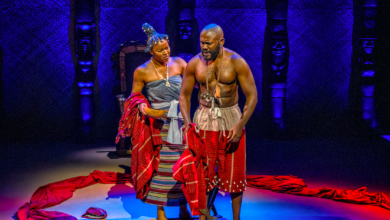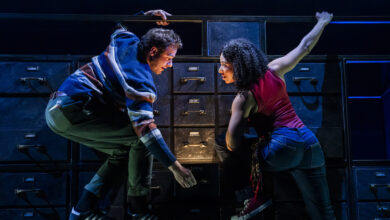Review: Hamlet, Lion and Unicorn Theatre
This bleak, modern adaptation is a great vehicle for the best lines from Hamlet. It’s clever, pacey, and exceptionally funny.summary
Rating
Excellent
This play was advertised as “guaranteed to be unlike anything you’ve seen before”, and it certainly delivers on that promise. It’s a great vehicle for the best lines from William Shakespeare’s Hamlet, but it is not Hamlet. It’s something else entirely, and still very good – clever, pacey, and exceptionally funny.
The stage is a student-y living room, including drug paraphernalia, half-drunk cups of tea, scattered books and magazines, and a sofa that only a landlord could love. The only characters we see on stage are Hamlet and Horatio, who between them take on a fraction of the original text. All other characters and scenes are dispensed with. Director Harry Reed has reconstructed the four-hour tragedy about revenge, madness, inaction and suicidal ideation into an hour-long play where that suicidal ideation takes centre-stage.
There is something almost frightening about Joseph Ryan-Hughes as Hamlet. He has the air of a conspiracy theorist, pacing the stage with nervous and frantic energy. His face is wonderfully expressive, and he speaks with convincing spontaneity. This actor exactly nails the combination of fragility, cruelty and humour which make Hamlet such a compelling character.
“Were you not sent for?” Hamlet shouts at one point. Horatio denies it, but if you were Hamlet’s mother, Horatio is exactly the man you’d send for. Alex Dean plays the role as a steady and patient presence, and words originally written for other characters sit naturally in his voice. Taking on all these contradictory lines gives him a multifaceted quality. But rather than becoming, like Hamlet can be, a Rorshach test of inconsistencies that you could read anything into, he remains a fixed point. He is the same man, trying every angle he can think of to keep his friend alive.
Hamlet is quicker-witted, and maybe smarter, but Horatio knows how to be a person, without veering from crisis to crisis. Horatio makes no attempts to match Hamlet’s level of energy: he waits, he reacts, he turns the television on. Even with only two actors on stage, it’s possible for one of them to fade into the background. Despite the asymmetric dynamic, their friendship is clearly deep and enduring. Most of Hamlet’s soliloquys are spoken directly to his friend. It’s a phenomenal performance from both actors, and I’d love to see them play the same roles in a full version of Hamlet.
The changes to the text have changed its character irrevocably. There’s a scene where Hamlet is watching the players, and is distraught to see an actor crying during rehearsal. He laments, “What’s Hecuba to him, or he to Hecuba, / That he should weep for her? What would he do, / Had he the motive and the cue for passion / That I have?” But in this version, unlike in Shakespeare’s original, Hamlet has no real motive or cue for passion. There is no evidence of any foul play in his father’s death, except for in Hamlet’s own feverish and drug-addled imagination. He is not feigning madness, but is straightforwardly mentally ill. In the absence of the spying and intrigue of the Danish court, he is not feigning anything.
When the end comes (spoiler alert), it is upsetting without being a satisfying narrative. Watching someone talk about killing themselves for an hour, and then eventually committing suicide, is a bleak experience. Sometimes a person’s mind doesn’t work right, and they want to die. There is no good reason for it. It isn’t destiny, and it isn’t a revenge tragedy, but it happens anyway. However unhappy this is to imagine, it is true. In this respect, this Hamlet has held the mirror up to nature.
Written by: William Shakespeare
Directed by: Harry Reed
Produced by: Series Two Theatre Company
Hamlet has completed its current run. Check the company website for future performances or new shows.







